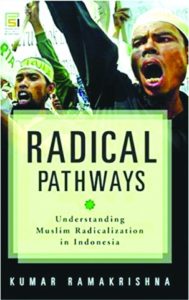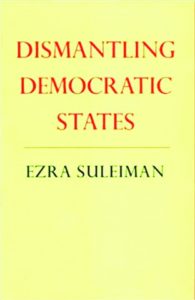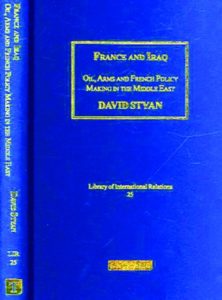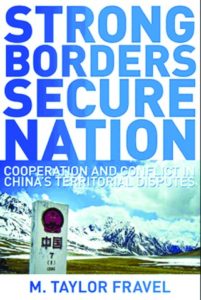

Radical Pathways: Understanding Muslim Radicalization in Indonesia
Kumar K. Ramakrishna
Praeger (2009)
Rs1,960
This book explores two of the most crucial areas of the war on terror: 1) why some Muslims turn to violent jihad, and 2) that process in the world’s most populous Muslim nation, Indonesia. The recent history of terrorism in Indonesia has brought this country into the world spotlight: the Bali nightclub bombing by Islamists in 2002 was one of the worst terrorist attacks in history. The recent violence following the executions of three of the Bali bombers, together with a number of thwarted bomb plots, demonstrate the continuing danger posed by radicalized violent Islamists in the country. Written by one of Southeast Asia’s leading counter-terrorism experts, Radical Pathways offers innovative new perspectives on the sources of violent Muslim radicalization and what should be done to counter it.
The last chapter provides useful suggestions based on the British-Malaysian experience in countering a communist insurrection, using cognitive immunization, face-to-face interfaith activity, and a public diplomacy that integrates rhetoric and actual deeds. The book is well produced with glossary, notes, and bibliography.
Radical Pathways is one of the first that focuses explicitly on the JI and one that specifically examines its success in recruiting new members. In doing so, the book makes a valuable contribution to our understanding about the causes of radicalization.
Kumar Ramakrishna is Associate Professor and Head of the Centre of Excellence for National Security at the S. Rajaratnam School of International Studies in Singapore

Dismantling Democratic States
Ezra Suleiman
Princeton University Press (August 24, 2003)
Rs4,920
Bureaucracy is a much-maligned feature of contemporary government. And yet the aftermath of September 11 has opened the door to a reassessment of the role of a skilled civil service in the survival and viability of democratic society. Here, Ezra Suleiman offers a timely and powerful corrective to the widespread view that bureaucracy is the source of democracy’s ills. This is a book as much about good governance as it is about bureaucratic organizations. Suleiman asks: Is democratic governance hindered without an effective instrument in the hands of the legitimately elected political leadership? Is a professional bureaucracy required for developing but not for maintaining a democratic state? Why has a reform movement arisen in recent years championing the gradual dismantling of bureaucracy, and what are the consequences?
Suleiman undertakes a comparative analysis of the drive toward a civil service grounded in the New Public Management. He argues that “government reinvention” has limited bureaucracy’s capacity to adequately serve the public good. All bureaucracies have been under political pressure in recent years to reduce not only their size but also their effectiveness, and all have experienced growing deprofessionalism and politicization. He compares the impact of this evolution in both democratic societies and societies struggling to consolidate democratic institutions. Dismantling Democratic States cautions that our failure to acknowledge the role of an effective bureaucracy in building and preserving democratic political systems threatens the survival of democracy itself.
Foreign Affairs says: “In this powerful defense of the modern bureaucratic state, Suleiman argues that decades of attacks on government bureaucracy by Western politicians have undermined their own authority, weakened citizenship, and imperiled democratic governance. . . . Suleiman acknowledges that a leaner, more efficient state may be necessary today, but he makes a compelling case for the continuing necessity of the bureaucratic machine.”
Spencer D. Bakich of the Virginia Quarterly Review writes: “Suleiman demonstrates precisely how legitimacy requires bureaucracy that is effective and how new and old democracies alike require bureaucracies at each stage of development. . . . This is an important work and should be considered by those concerned with the proper functioning of democratic states.”
And The Washington Post says: “The relentless and prolonged assault by politicians and the public on the competence and motives of their government bureaucracies is slowly but surely undermining democracy in the Americas and Europe. . . . The book arrives during a moment of particularly nasty relations between major parts of Washington’s bureaucracy and a conservative Republican president who bemoans having to live and work here. This is a happy accident of timing. The book has no partisan ax to grind, and its insights could be useful to the Bush administration—both at home and in its unexpected bonanza of nation-building projects abroad.”
Ezra Suleiman is the IBM Professor of International Studies, Professor of Politics, and Director of the Program in European Politics and Society at Princeton University. He received his A.B. degree from Harvard, and later continued his graduate work at the Universities of London and Paris, receiving his M.A. and Ph.D. degrees from Columbia University.

France and Iraq: Oil, Arms and French Policy Making in the Middle East
David Styan
IB Tauris (2006)
Rs7,298
France’s opposition to the Iraq war in 2003 was greeted with surprise and outrage by Anglo-American politicians. But as David Styan argues in his penetrating new book, Chirac’s stance was consistent with a decades-long reorientation of French foreign policy. Styan dissects the processes by which a country notorious for its suppression of Algerian independence came to cast itself as the anti-imperialist champion of the Arab world. Styan charts France’s divergence from the other Western powers in its relations with Iraq, uncovering the interplay between historical relationships, military industrial interests and geopolitics, which gave rise to it. Negotiating these currents are a range of vivid personalities from De Gaulle to Mitterrand.
David Styan completed his Masters at the University of Bordeaux and his PhD at the London School of Economics. He currently teaches in the School of Politics at Birkbeck College, University of London.

Problematics of Military Power: Government, Discipline and the Subject of Violence
Michael S. Drake
Routledge (2013)
Rs6,069
This book traces the relations between the organization of violence and social and political order from ancient Rome to early modern Europe. Following the work of Michel Foucault, the author studies the ways authority, obedience and forms of self-conduct were produced by the micro-techniques used to govern the bodies of violence deployed in different forms of warfare.
Michael S Drake writes and teaches political, cultural and historical sociology, social and political theory, on violence and war, political memory, and the body in culture, politics and society. He is currently working on a number of interrelated projects, including: the political significance of the dead body, literary sociology, new theories of power and the state, social conditions of creativity, and the cultural constitution of collective identities.

Strong Borders, Secure Nation: Cooperation and Conflict in China’s Territorial Disputes
M. Taylor Fravel
Princeton University Press (2008)
Rs3,482
As China emerges as an international economic and military power, the world waits to see how the nation will assert itself globally. Yet, as M. Taylor Fravel shows in Strong Borders, Secure Nation, concerns that China might be prone to violent conflict over territory are overstated. The first comprehensive study of China’s territorial disputes, Strong Borders, Secure Nation contends that China over the past sixty years has been more likely to compromise in these conflicts with its Asian neighbors and less likely to use force than many scholars or analysts might expect.
By developing theories of cooperation and escalation in territorial disputes, Fravel explains China’s willingness to either compromise or use force. When faced with internal threats to regime security, especially ethnic rebellion, China has been willing to offer concessions in exchange for assistance that strengthens the state’s control over its territory and people. By contrast, China has used force to halt or reverse decline in its bargaining power in disputes with its militarily most powerful neighbors or in disputes where it has controlled none of the land being contested. Drawing on a rich array of previously unexamined Chinese language sources, Strong Borders, Secure Nation offers a compelling account of China’s foreign policy on one of the most volatile issues in international relations.
“Fravel’s is an elegant argument that works well to explain Chinese behavior and holds promise for application elsewhere,” writes Andrew J. Nathan in Foreign Affairs. “This comprehensive, compelling volume by Fravel seeks to address the overstated concerns that China might be prone to violent conflict over territory,” adds S.K. Ma in Choice.
“This is a tour de force work of scholarship that is comprehensive, empirically rich and analytically strong. . . . For anyone who works on contemporary China, this book will be an indispensable reference volume,” says Andrew Scobell in Pacific Affairs. And, “The book is not only a necessary work for everyone dealing with Chinese politics, but also it deserves to become a new standard for the study of international politics in general,” adds Bart Dessein in International History Review.
M. Taylor Fravel is Associate Professor of Political Science and member of the Security Studies Program at MIT. Taylor is a graduate of Middlebury College and Stanford University, where he received his PhD. He has been a Postdoctoral Fellow at the Olin Institute for Strategic Studies at Harvard University, a Predoctoral Fellow at the Center for International Security and Cooperation at Stanford University, a Fellow with the Princeton-Harvard China and the World Program and a Visiting Scholar at the American Academy of Arts and Sciences.

